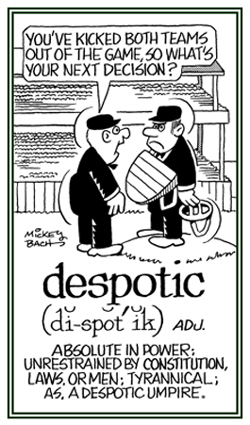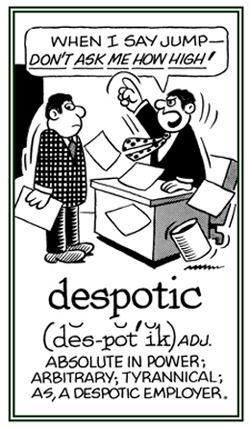-ic
(Greek: a suffix; pertaining to; of the nature of, like; in chemistry, it denotes a higher valence of the element than is expressed by -ous)
dactylic
1. Belonging to a digit (a finger or a toe).
2. A metrical foot consisting of one long and two short syllables, or of one stressed and two unstressed syllables; such as, tenderly.
2. A metrical foot consisting of one long and two short syllables, or of one stressed and two unstressed syllables; such as, tenderly.
deific
1. Making someone divine or giving him/her the status of a god or goddess.
2. With a divine nature or the status of a god or goddess.
2. With a divine nature or the status of a god or goddess.
democratic (adjective), more democratic, most democratic
1. Of the nature of, or characterized by, democracy; advocating or upholding democracy: Jack learned in school that being a democratic person was very worthwhile and had many positive aspects, including being able to articulate one's own opinion.
2. Name of the political party originally called Anti-Federal and afterwards Democratic-Republican: The democratic faction initially favored a strict interpretation of the Constitution with regard to the powers of the general government and of the individual States, and the least possible interference with local and individual liberty. Since 1854I, it is in opposition to the Republican party, formerly called Federals and Whigs.
2. Name of the political party originally called Anti-Federal and afterwards Democratic-Republican: The democratic faction initially favored a strict interpretation of the Constitution with regard to the powers of the general government and of the individual States, and the least possible interference with local and individual liberty. Since 1854I, it is in opposition to the Republican party, formerly called Federals and Whigs.
demonic
1. Relating to, or resembling, a demon; especially, in wickedness.
2. A reference to being intense, frantic, or wild; as if, driven or possessed by a demon.
2. A reference to being intense, frantic, or wild; as if, driven or possessed by a demon.
demotic (adjective), more demotic, most demotic
1. Relating to or involving ordinary people.
2. Relating to a simplified form of hieroglyphics, the writing system used in ancient Egypt. Literally, "of the people".
2. Relating to a simplified form of hieroglyphics, the writing system used in ancient Egypt. Literally, "of the people".
dendric
Pertaining to or possessing a dendron.
dendritic
1. Dendroid; tree-like structures or markings.
2. Branching like a tree; aborescent.
3. Relating to the dendrites of nerve cells.
2. Branching like a tree; aborescent.
3. Relating to the dendrites of nerve cells.
dendroclastic
Breaking or destroying trees; a destroyer of trees.
denticulate
dentotropic
dermic
dermotropic
despotic (adjective), more despotic, most despotic
Autocratic; tyrannical; descriptive of a person who controls others with absolute power: A despotic individual has the power to make decisions that others must accept and obey or they could lose their positions, privileges, benefits, or even be thrown out of an organization.

© ALL rights are reserved.

© ALL rights are reserved.
Go to this Word A Day Revisited Index


Go to this Word A Day Revisited Index
so you can see more of Mickey Bach's cartoons.
diachronic (adjective), more diachronic, most diachronic
1. In medicine, relating to something systematically observed over time in the same subjects throughout as opposed to synchronic or cross-sectional: In his studies, John was involved in diachronic research regarding patients only where there was strict stability of all elements.
2. Pertaining to a linguistic study concerned with the historical development of a language: Since Jane was interested in languages, she decided to learn more about the diachronic features of German throughout time.
3. In archaeology, denoting actions or things which occur over time: In Sam's diachronic research, he classified the artifacts he had found in his region as they developed or changed throughout sequential periods of time.
2. Pertaining to a linguistic study concerned with the historical development of a language: Since Jane was interested in languages, she decided to learn more about the diachronic features of German throughout time.
3. In archaeology, denoting actions or things which occur over time: In Sam's diachronic research, he classified the artifacts he had found in his region as they developed or changed throughout sequential periods of time.
diadermic
A reference to penetration through the skin.


